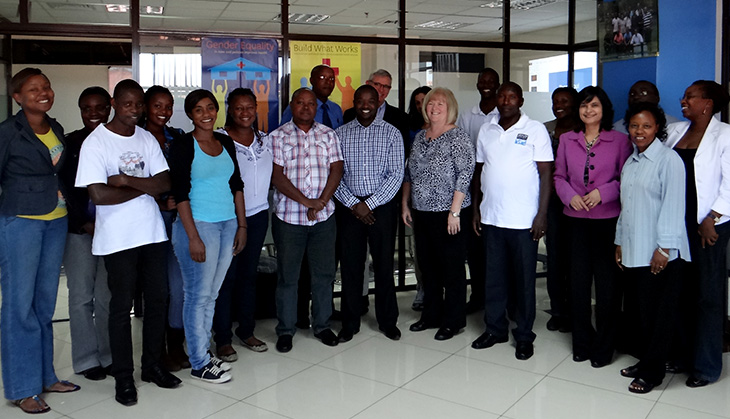The Health Policy Project ended in 2016. Work continued under Health Policy Plus (HP+) until 2022.
NEWS & VIEWS

Health Policy Project/Kenya
by Rebecca Mbuya-Brown
NAIROBI, Kenya—Universal health coverage (UHC) has the potential to transform the lives of thousands of Kenyans—guaranteeing access to lifesaving health services while helping individuals and families avoid crippling health expenses that push so many into poverty. Yet, achieving universal coverage is a daunting task.
The government recently eliminated payments for primary and maternal health services in public facilities, demonstrating its commitment to achieving UHC. However, many challenges remain as Kenya struggles to provide enough health staff and infrastructure to meet the needs of its growing population.
From March 18-20, 2014, the Kenya Health Policy Forum brought together health financing experts with local and national government representatives to discuss these challenges and find a way to fast-track progress toward UHC.
Kenya’s Ministry of Health (MOH), which convened the forum in partnership with the USAID-funded Health Policy Project (HPP) and the World Bank, also hoped to gain insights to refine the objectives of the country’s new Health Policy (2014−2030). Representatives from Brazil, Ethiopia, Ghana, India, and Mexico shared experiences and lessons learned from their efforts to achieve universal coverage.
Drawing on the experiences from other countries, forum participants honed in on governance, efficiency, and innovative financing as keys to success.
Governance
Kenya must strengthen governance at all levels to maximize benefits from investments in the health sector.
Since the adoption of Kenya’s new constitution in 2010, devolution has shifted responsibility for healthcare provision to county governments. HPP is working with partners in Kenya to strengthen the country’s health systems during the transition. The project collaborates with government and health institutions to develop effective and efficient financing mechanisms that maximize the country’s funding resources to deliver high-quality, equitable, and affordable healthcare services to all Kenyans.
Devolution seeks to achieve universal coverage by bringing health decisions closer to citizens, ensuring efficient resource distribution, and improving equity—improvements that are sorely needed in Kenya, where the health system is burdened by high out-of-pocket expenditures and a significant preventable disease burden.
Financing
Sustainable financing is the key to achieving UHC. However, Kenya’s public spending on health is low, resulting in limited service coverage and inequitable access to services. Forum participants noted that, to achieve UHC in Kenya, priority public health programs require innovative domestic financing as donor support declines. Moreover, county governments must be able to allocate health funds to local priorities, allowing them to mobilize resources to meet needs as they arise.
The forum identified health insurance as a vital component of UHC financing strategies, and emphasized the importance of putting the right legal frameworks in place. A strong national risk pool and well-managed single purchaser have supported UHC in other countries and could do the same in Kenya. Experience from India shows that effective regulation of health insurance is required to address market failures, safeguard against systemic risk, protect consumers, and enhance efficiency.
Forum participants also emphasized the need to focus on primary healthcare services—which target the poorest and most vulnerable segments of society—and to ensure that any package of essential services is broadened to include noncommunicable diseases.
Efficiency
Kenya needs to improve healthcare efficiency to make the most of current investments—particularly as donor support begins to decline. Dr. Urbanus Kioko, of the University of Nairobi, presented preliminary results from a study of the technical efficiency of Kenya’s public and private health facilities. The study found public dispensaries were operating at only 47 percent efficiency. It also found that if Kenya’s public district hospitals were operating efficiently, they could offer 27 percent more goods and services with current levels of investment.
The country must address the supply side challenges that are preventing it from capitalizing on health investments. The 2012 Public Expenditure Tracking Survey conducted by HPP found significant deficiencies in funding flows. Most of the facilities surveyed experienced disbursement delays of two to three months. Moreover, 50 percent of dispensaries and 30 percent of health centers received inaccurate funding amounts, disbursed in unequal amounts inconsistently throughout the year.
Way forward
The March forum was only a first step. Closing the conference, Dr. John Masasabi, the head of the Directorate of Policy, Planning, and Healthcare Financing, outlined how the MOH would use the lessons learned as it charts the path toward achieving universal health coverage.
Key MOH commitments included:
- Creating a UHC unit to compile and generate evidence to inform UHC reforms
- Reforming the National Hospital Insurance Fund (NHIF)
- Creating a strong regulatory framework for all health insurance to provide better healthcare services for the poor
- Establishing a unified legal framework for regulation to improve the quality of care.
What's New
- Something to Build On: “Innovation Exchange” Celebrates the Health Policy Project’s Close and a New Beginning
- What Will it Take for Tanzania to Achieve ART Targets and Ensure Long-Term Sustainability of the HIV Response?
- Helping Kenya’s County Leaders Advocate for Increased Health Investments
- HPP Holds Working Meeting on Ensuring Responsible PEPFAR Transitions for Key Populations
- Health Policy Project Celebrates 2016 International Women's Day
- HPP Staff Participate in White House Conference on HIV Stigma Reduction

